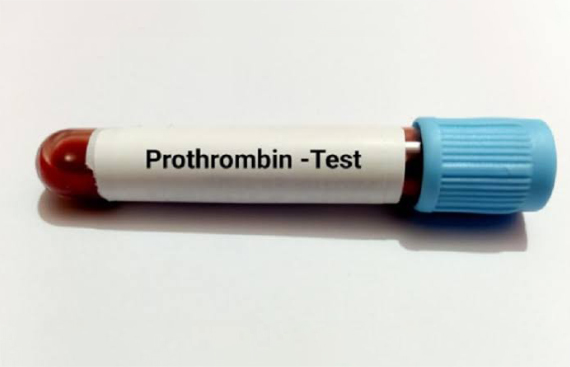What is Prothrombin Time?

Prothrombin, a liver-produced protein, is amongst the clotting factors crucial for blood clot formation. When injuries induce bleeding, these clotting factors collaborate to facilitate clotting. The speed of clot formation is influenced by the quantity and functionality of clotting factors. Inadequate clotting factors may lead to excessive bleeding, while excessive clotting factors may predispose to hazardous clots in blood vessels. A prothrombin time (PT) test gauges clot formation duration in a blood sample, while an international normalised ratio (INR) derives from PT test out- comes. The PT INR test aids in diagnosing bleeding or clotting disorders and assesses the efficacy of anti- coagulant medications. Read on to learn more about the INR and PT test.
Why is a Prothrombin Time Test Done?
Healthcare providers conduct PT tests to assess the adequacy of blood clotting. These tests serve various pur- poses, including:
- Monitoring Warfarin Effectiveness: Warfarin is a blood thinner vital for preventing dangerous blood clots. PT tests are commonly performed to ensure the appropriate dosage of warfarin, reducing the risk of conditions like deep venous thrombosis or pulmonary embolism.
- Surgical Planning: Before undergoing surgery, healthcare providers may verify normal blood clotting to mitigate excessive bleeding risks during the procedure.
- Diagnosis of Clotting and Bleeding Disorders: PT tests aid in diagnosing conditions leading to excessive blood loss. Symptoms such as unexplained bruising, heavy nosebleeds, or persistent bleeding from cuts can prompt healthcare providers to conduct PT tests for diagnosis.
- Assessment of Liver Function: Abnormalities in prothrombin levels may indicate a liver disease. PT tests, alongside other liver function tests, help in evaluating the severity of liver disease, aiding in diagnosis and treatment planning.
Why is a Prothrombin Time Test Done?
You may require a PT/INR test under the following circumstances:
- Regular Warfarin Use: If you are on a warfarin regimen, periodic INR and PT tests ensure you are administered the correct dosage, optimising treatment effectiveness.
- Bleeding Disorder Symptoms: A PT test may be necessary for diagnostic purposes if you exhibit symptoms indicative of bleeding disorders. Symptoms of a bleeding disorder may encompass easy bruising, unexplained heavy bleeding, unusually heavy menstrual periods, or persistent nosebleeds.
- Clotting Disorder Symptoms: A PT test may be necessary for diagnostic purposes if you exhibit symptoms indicative of clotting disorders. Symptoms suggestive of a clotting disorder include red streaks or redness on the legs, leg tenderness or pain, leg swelling, difficulty breathing, chest pain, cough, or rapid heartbeat.
- Surgical Preparation: Prior to undergoing surgery, an INR and PT test is often conducted to ensure normal blood clotting, reducing the risk of excessive bleeding during the procedure.
Ideal Prothrombin Time Test Results
Prothrombin time is typically measured in seconds, reflecting the duration it takes for blood clot formation. Alternatively, it is commonly expressed as the international normalised ratio. Notably, INR was developed by the World Health Organization (WHO) to standardise measurements across various laboratory testing methodologies. The normal ranges for PT/INR results are as follows:
- Prothrombin Time: 11 to 13.5 seconds
- INR: 0.8 to 1.1
- INR for individuals taking warfarin: 2.0 to 3.0
What Do Prothrombin Time Test Results Mean?
If you're taking warfarin, then your test results will likely be reported as INR levels. Conversely, if you're not on warfarin, the results may be provided in either INR levels or the time it takes for your blood to clot.
For individuals taking warfarin:
- Low INR levels may elevate the risk of dangerous blood clots.
- High INR levels may heighten the risk of hazardous bleeding.
In such cases, healthcare providers often adjust the warfarin dosage to mitigate these risks effectively.
If you're not on warfarin and your INR or prothrombin time results deviate from the normal range, then it could indicate the presence of:
- A clotting disorder, marked by excessive clot formation in arteries or veins
- A bleeding disorder, characterised by impaired blood clotting ability leading to excessive bleeding
- A liver disease
- Vitamin K deficiency as the vitamin plays a pivotal role in blood clotting mechanisms
A prothrombin time test is typically amongst the initial assessments conducted to diagnose bleeding or clotting disorders. However, additional tests may be necessary before your healthcare provider can confirm a diagnosis. The PT INR test price can vary depending on your choice of diagnostic lab. At Apollo 24|7, the PT INR test price is ?460
Read More News :
Embracing Innovation in Trading: A Dive into Modern Platforms
Lava International Appoints Rajesh Sethi as Group Chief Financial Officer


.jpg)
